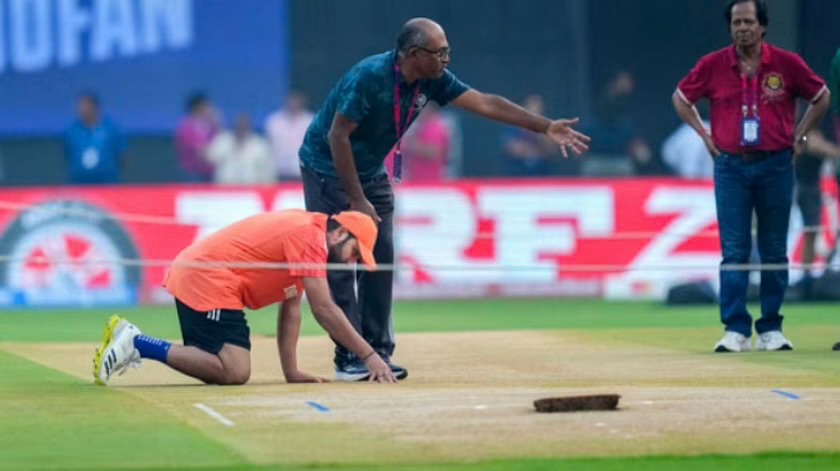
The ICC ODI World Cup‘s first semi-final between India and New Zealand started at Mumbai’s Wankhede Stadium on Thursday, November 15. India, having won all nine games, topped the points table.
On the other hand, New Zealand stumbled mid-tournament but secured fourth place, earning a spot in the semi-final. Despite this, the Kiwis have had the upper hand over India in ICC events, winning nine out of 13 completed matches.
New Zealand surprised everyone by beating India in a past World Cup, but later, in the recent World Cup, India won against New Zealand in a match during the league stage.
However, the home team won the encounter during the league stage of the 2023 ODI World Cup, securing a victory by four wickets in Dharamsala.
The Wankhede pitch has been a major topic of discussion leading up to this match, sparking controversy. This mirrors other situations in past World Cups where debates over the pitch became the focal point.
Let’s explore three instances where pitch conditions stirred controversy in World Cup matches:
#3 The 2023 World Cup semi-final between India and New Zealand
Controversy surrounds the pitch for the India-New Zealand semi-final in the 2023 World Cup. Initially scheduled for a fresh pitch (Pitch 7) at the Wankhede Stadium, a late decision shifted the game to the sixth pitch, already used for two matches – South Africa vs England and India vs Sri Lanka.
This last-minute change deviates from the planned pitch rotation (6-8-6-8-7) for Wankhede in the 2023 World Cup, where 6-8-6-8 has been the pattern so far, with Pitch 7 set for the final game (semi-final) in Mumbai.
Reports indicate that the Indian team sought a slower pitch for the first semi-final to favor their playing style. Despite accusations against the BCCI, it falls within the rules as per World Cup playing conditions.
It states:
“The relevant ‘ground authority’ is “responsible for the selection and preparation of the pitch” before any given match – in this case, the Mumbai Cricket Association (MCA).”
However, the ICC’s independent pitch consultant, Andy Atkinson, is reportedly frustrated by alterations to agreed plans during the World Cup. It’s unclear if a similar change to the pitch might occur if India reaches the final in Ahmedabad.
#2 The 2015 World Cup match between Pakistan and Zimbabwe
Ex-Pakistan fast bowler Sarfraz Nawaz gained attention in the 2015 World Cup in Australia and New Zealand when he claimed that the pitches were customized to favor the Indian team.
His comments followed Pakistan’s 20-run victory over Zimbabwe on a tricky surface at the Gabba in Brisbane. Meanwhile, during that time, India played on three batsman-friendly pitches against Pakistan, Australia, and the U.A.E at Adelaide, Melbourne, and Perth.
During a TV show after the Pakistan-Zimbabwe match, Sarfraz stated:
“You look at the matches played so far in this World Cup that where India has played the pitches have been prepared to suit their strengths.”
”Look at today’s match [ Pak-Zim], the pitch was double paced and had lot of bounce which goes against our strengths. I would ask Pakistan Cricket Board to take up this issue with the ICC and find out what is going on.”
India won their tournament opener against Pakistan by 76 runs, scoring 300 at the Adelaide Oval. Even though the ICC didn’t address the matter, it sparked debates and arguments between experts and fans from both nations.
However, both teams faced setbacks in the knockout stage of the World Cup, with India losing to Australia in the semi-final, and Pakistan being defeated by the same opponent in the quarter-final.
#1 The 2019 World Cup match between India and New Zealand
The pitches in the 2019 ODI World Cup were criticized for being unlike the typical English pitches. The controversy peaked when India lost to New Zealand in a low-scoring semi-final in Manchester, failing to chase 240 and getting bowled out for 221.
Despite expecting high-scoring games, the World Cup in England had many matches with lower scores, making fans, experts, and players unhappy. The ICC denied telling groundsmen to make slower pitches than usual.
“Essentially the venues are responsible for the pitch preparation which is done with oversight and guidance from the ICC and our independent pitch consultant,” the ICC stated.
“The guidance we give any host of an ICC event is to prepare the best possible pitches for the conditions in that country – so in this case the best possible ODI pitch for typical English conditions and we would also look for even bounce and good carry.”
“The ICC does not instruct groundsmen to prepare pitches in a certain way to advantage, or disadvantage, any team,” it added.
In the final match, England and New Zealand both scored 241, making it a close game. England’s Jonny Bairstow and commentator Mark Butcher raised questions about the quality of the pitches in the home World Cup.
Get the latest cricket news here, like us on Facebook, and follow us on Twitter and Instagram for more such updates.





![[Watch] Bhandari’s Lightning-fast Stumping Removes Bipin In NPL 2024 Bhandari's lightning-fast stumping removes Bipin in NPL 2024](https://cricfit.com/wp-content/uploads/2024/12/20241216_203938-100x75.jpg)
